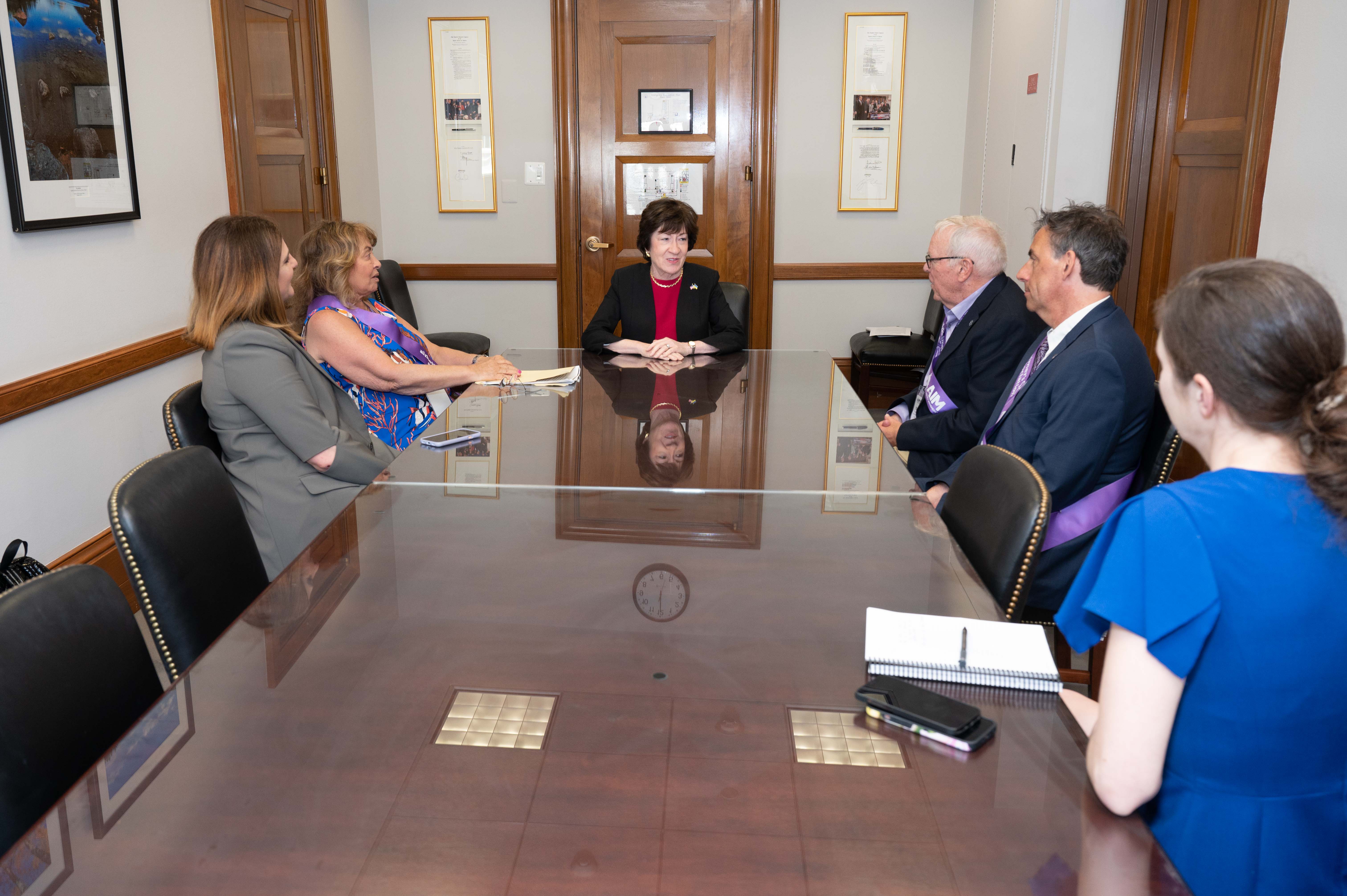Senator Collins Meets with Maine Alzheimer’s Advocates, Introduces Bills to Bolster Research

Click HERE to download a high-resolution photo
Click HERE to download b-roll video
Washington, D.C.— U.S. Senator Susan Collins, a founder and co-chair of the Congressional Task Force on Alzheimer’s disease, met with members of the Alzheimer’s Association of Maine in her Washington, D.C., office. Deborah Carr of Falmouth and Thomas O’Connor of Portland both lost spouses to Alzheimer’s disease.
The advocates thanked Senator Collins for championing investments for Alzheimer’s research through her role as a senior member of the Appropriations Committee. They also expressed appreciation for a pair of bills Senator Collins recently introduced that would cement and build on the important progress that has been made to prevent and effectively treat Alzheimer’s disease:
- The NAPA Reauthorization Act—authored by Senators Susan Collins (R-ME), Mark Warner (D-VA), Shelley Moore Capito (R-WV), Ed Markey (D-MA), Jerry Moran (R-KS), and Bob Menendez (D-NJ)—would reauthorize the National Alzheimer’s Project Act (NAPA) through 2035. Senator Collins authored NAPA in 2011, which created a coordinated strategic national plan to prevent and effectively treat Alzheimer’s disease by 2025. The law is set to expire soon and must be reauthorized to ensure that research investments remain coordinated and their impact is maximized. The NAPA Reauthorization Act would modernize the legislation to reflect strides that have been made to understand the disease, such as including a new focus on promoting healthy aging and reducing risk factors.
- The Alzheimer’s Accountability and Investment Act—authored by Senators Collins, Markey, Capito, Warner, Moran, and Menendez—would continue through 2035 a requirement that the Director of the National Institutes of Health submit an annual budget to Congress estimating the funding necessary for NIH to fully implement NAPA’s research goals. Only two other areas of biomedical research – cancer and HIV/AIDs – have been the subject of special budget development aimed at speeding discovery.
“We have made tremendous progress in recent years to boost funding for Alzheimer’s research, which holds great promise to ending this disease that has had a devastating effect on millions of Americans and their families,” said Senator Collins. “The two bills I have introduced will maintain our momentum and make sure that we do not take our foot of the pedal just as our investments in basic research are beginning to translate into potential new treatments. We must not let Alzheimer’s define our children’s generation as it has ours.”
“Thanks to the National Alzheimer’s Project Act (NAPA), we’ve made tremendous progress in the fight against Alzheimer’s. The passage of the NAPA Reauthorization Act and the Alzheimer’s Accountability and Investment Act is the next important step to continue the work of the National Plan to Address Alzheimer’s Disease and ensure that the nation continues to prioritize addressing Alzheimer’s and all other dementia,” said Robert Egge, Alzheimer's Association chief public policy officer and AIM executive director. “On behalf of the Alzheimer’s Association, I would like to extend my deepest thanks to the sponsors for introducing this important bipartisan legislation to help improve the lives of those impacted by Alzheimer’s throughout the country. The Alzheimer’s Association looks forward to working with our tireless advocates and these congressional champions to advance this bipartisan legislation.”
“The passage of the National Alzheimer’s Project Act more than a decade ago was a turning point in our nation’s fight against Alzheimer’s, fundamentally changing the trajectory of disease research for the better,” said George Vradenburg, chair and co-founder of UsAgainstAlzheimer’s. “UsAgainstAlzheimer’s is thankful to Sen. Collins for her leadership on behalf of patients living with Alzheimer’s and their loved ones. We look forward to working with her and other members of Congress to reauthorize NAPA and continue driving toward an end to Alzheimer’s disease.”
Alzheimer’s costs our nation an astonishing $321 billion per year, including $206 billion in costs to Medicare and Medicaid. If we continue along this trajectory, Alzheimer’s is projected to claim the minds of 12.7 million seniors and nearly surpass $1 trillion in annual costs by 2050. In 2021, family caregivers provided 16 billion hours of unpaid care for loved ones with dementia. Nearly half of baby boomers reaching age 85 will either be afflicted with Alzheimer’s or caring for someone who has it.
###